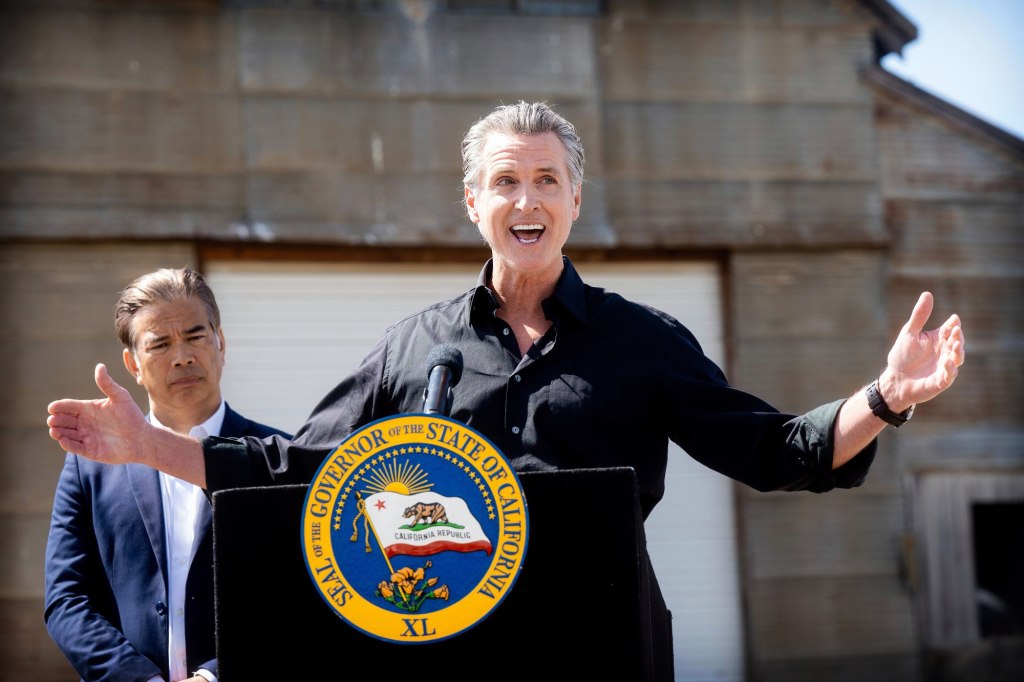
California Gov. Gavin Newsom hypocritically flipped on climate change to protect his 2028 presidential campaign. For years, Newsom viciously demonized America’s energy producers and pushed ineffective green policies that caused oil refinery closures and perennially high gasoline and energy prices.
But even higher gas prices would quickly sink Newsom’s presidential campaign, so last month he signed an energy and climate legislation package with the purported goal of increasing oil drilling permits and importing oil, including foreign oil, to increase supply and thus mitigate surging energy costs. His announcement followed Valero’s and Phillips 66’s forced shuttering of two major California refineries.
Yet, the Newsom Administration continues politicized lawfare against the energy industry, claiming that it is solely responsible for the alleged effects of climate change, even as Newsom scrambles to keep it operating in California. California partnered with mass tort plaintiffs’ attorneys to sue American energy producers and wrongly accuse them of, among other things, public nuisance, false advertising, and failure to warn. On November 7, the California Superior Court will hear arguments from the defendants on why California’s climate suit should be dismissed.
Approximately 60 other states and municipalities – including the cities and counties of San Francisco, Santa Cruz, San Mateo and Oakland – also have sued the energy producers; many of these lawsuits are suspiciously similar, sharing the same claims and plaintiffs’ attorney firms. The lawsuits’ biggest problem is that climate change issues, particularly those concerning interstate carbon emissions, fall beyond the purview of state courts. The Constitution makes clear that states cannot extend their own laws to provide relief for alleged harms originating from outside their borders, especially where Congress passed an exclusive governing federal law (e.g. the Clean Air Act), to address such public policy issues.
Congress rightfully was concerned that a 50-state patchwork of different laws and standards would interfere with federal policies and cause such legal and regulatory chaos that no industry or company could possibly comply. Additionally, the federal government has exclusive authority to conduct international relations and decide foreign policy.
Because greenhouse gasses are not static, it is impossible to accurately separate which ones emanated in California versus which ones came from other states or nations such as China and India, who are the world’s largest greenhouse-gas emitters and polluters by far, and who consume and burn so much oil that they buy millions of barrels from Russia. Therefore, it is impossible for the courts to accurately allocate purported liability.
Accordingly, federalism principles and our Constitution prohibit state courts from serving as national or international energy regulators. That is why several state courts, including in liberal jurisdictions like Maryland and conservative jurisdictions like South Carolina, have dismissed these cases, holding that these litigations do not belong in state court, but rather in federal court or, even better, in the federal political and legislative arena. The California courts should do the same.
Another major problem with these lawsuits is that, over the years, certain state courts have improperly allowed left-wing mass tort plaintiffs’ attorneys and their local government clients to get away with wrongly twisting and misusing public nuisance law.
Public nuisance has a narrow legal meaning that doesn’t apply to lawful and highly regulated energy production. Originating in 14th-century English common law, it refers to unlawful interference with the public’s use of shared land or water, such as blocking access or polluting a public area. Governments can sue to stop the illegal activity and recover cleanup costs from those directly responsible. But as the California Supreme Court noted in People ex rel. Gallo v. Acuna (1997), the illegal conduct must involve misuse of land or water. Moreover, selling lawful products does not constitute a public nuisance and cannot replace proper claims like false advertising or product liability.
At minimum, California courts must strike this portion of the lawsuit, because if not, one reasonably could see future lawsuits alleging that auto manufacturers or fast-food restaurant chains are liable for billions of dollars in abatement costs for the purported public nuisance of climate change or obesity and its related diseases. That is why the U.S. Court of Appeals for the 8th Circuit long-ago warned in Tioga Public School District v. U.S. Gypsum Company that these public nuisance lawsuits will “become a monster that would devour in one gulp the entire law of tort” and must be dismissed.
California’s climate lawsuit, with the growing wave of nearly identical state and municipal suits, proves that warning prescient. If these lawsuits succeed, the collective effect will be tens of billions of dollars seized from the energy industry, further exacerbating California’s energy crisis and spreading it across the country. Californians, and Americans for that matter, did not vote for these extreme policies. Legislation through litigation is an abuse of the courts, and California’s judges should rightfully put an end to it.
John Shu is a legal analyst and commentator who served in the administrations of Presidents George H.W. Bush and George W. Bush. He resides in Orange County, California.



